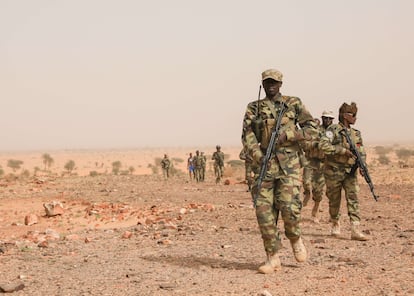Mass killing of civilians by security forces in Burkina Faso
Last Thursday, people in the town of Karma, in Yatenga province, awoke to a large group of armed men in military fatigues, driving motorcycles and armored pickup trucks and started indiscriminately killing people

The accounts are horrific. Women killed while carrying babies on their backs, the wounded hunted down and villagers watching the execution of their neighbors, fearing they’d be next. These are some of the atrocities allegedly perpetrated by Burkina Faso’s security forces in the north of the country, according to a statement Tuesday by locals from the village of Karma where the violence took place.
It was early morning last Thursday, when people in the village in Yatenga province, awoke to a large group of armed men in military fatigues, driving motorcycles and armored pickup trucks. “Some villagers, happy to see ‘our soldiers’, came out of their houses to welcome them. Unfortunately, this joy was cut short when the first shots rang out, also causing the first casualties,” said the statement from the villagers.
At least 150 civilians may have been killed and many others injured in the violence, said the United Nations High Commissioner for Human Rights, Ravina Shamdasani, in a statement Tuesday. The U.N. is calling for a prompt, thorough, independent and impartial investigation into what it called the “horrific killing of civilians”.
Earlier this week, Burkina Faso’s prosecutor said it had already opened an investigation into the killings, but put the death toll at 60, less than half the number estimated by the U.N. and local residents.
Jihadi fighters linked to al-Qaida and the Islamic State group have waged a violent insurgency in Burkina Faso for seven years. The violence has killed thousands of people and divided the country, leading to two coups last year.
Since Capt. Ibrahim Traore seized power in September 2022 during the second coup, extrajudicial killings of civilians have increased, according to rights groups and residents.
This incident — one of the deadliest against civilians by security forces — comes amid mounting allegations against the military for committing abuses against those it believes to be supporting the jihadis.
Earlier this month, Burkina Faso’s government announced it was opening other investigations into allegations of human rights abuses by its security forces after a video surfaced that appeared to show the extrajudicial killing of seven children in the country’s north.
The Associated Press this month published its own findings about the video. AP’s investigation determined that Burkina Faso’s security forces killed the children in a military base outside the town of Ouahigouya.
Days before last week’s attack, some 40 security sources were killed near Ouahigouya. Survivors said the soldiers accused them of being jihadi accomplices, by letting them pass through their town, according to the statement from the villagers.
One survivor of the attack, who did not want to be named for fear of reprisal, told The Associated Press that when the soldiers started shooting people indiscriminately, he grabbed the hand of his 11-year-old son and fled into this house with the rest of his family. However, the soldiers forced their way in, shooting open the door, he said.
“It was like a dream. If someone told us we wouldn’t die, I wouldn’t have believed it,” he said. They made them sit with a group of people in the middle of the village threatening to kill them multiple times. Instead, they killed another group of people and went door to door searching for two of the injured who had fled, he said.
Since the violence, people in the community haven’t been able to bury their relatives as an army roadblock prevented them reaching the village, said the statement.
The abuses will create a backlash against Burkina Faso’s junta and drive people into the hands of the jihadis, say conflict analysts.
“The reported human rights abuses advance the playbook of militants, it gives them talking points against the security forces and helps their recruitment efforts in the north. This is an awful recipe of consequences,” said Laith Alkhouri, CEO of Intelonyx Intelligence Advisory, which provides intelligence analysis.
Sign up for our weekly newsletter to get more English-language news coverage from EL PAÍS USA Edition
Tu suscripción se está usando en otro dispositivo
¿Quieres añadir otro usuario a tu suscripción?
Si continúas leyendo en este dispositivo, no se podrá leer en el otro.
FlechaTu suscripción se está usando en otro dispositivo y solo puedes acceder a EL PAÍS desde un dispositivo a la vez.
Si quieres compartir tu cuenta, cambia tu suscripción a la modalidad Premium, así podrás añadir otro usuario. Cada uno accederá con su propia cuenta de email, lo que os permitirá personalizar vuestra experiencia en EL PAÍS.
¿Tienes una suscripción de empresa? Accede aquí para contratar más cuentas.
En el caso de no saber quién está usando tu cuenta, te recomendamos cambiar tu contraseña aquí.
Si decides continuar compartiendo tu cuenta, este mensaje se mostrará en tu dispositivo y en el de la otra persona que está usando tu cuenta de forma indefinida, afectando a tu experiencia de lectura. Puedes consultar aquí los términos y condiciones de la suscripción digital.








































